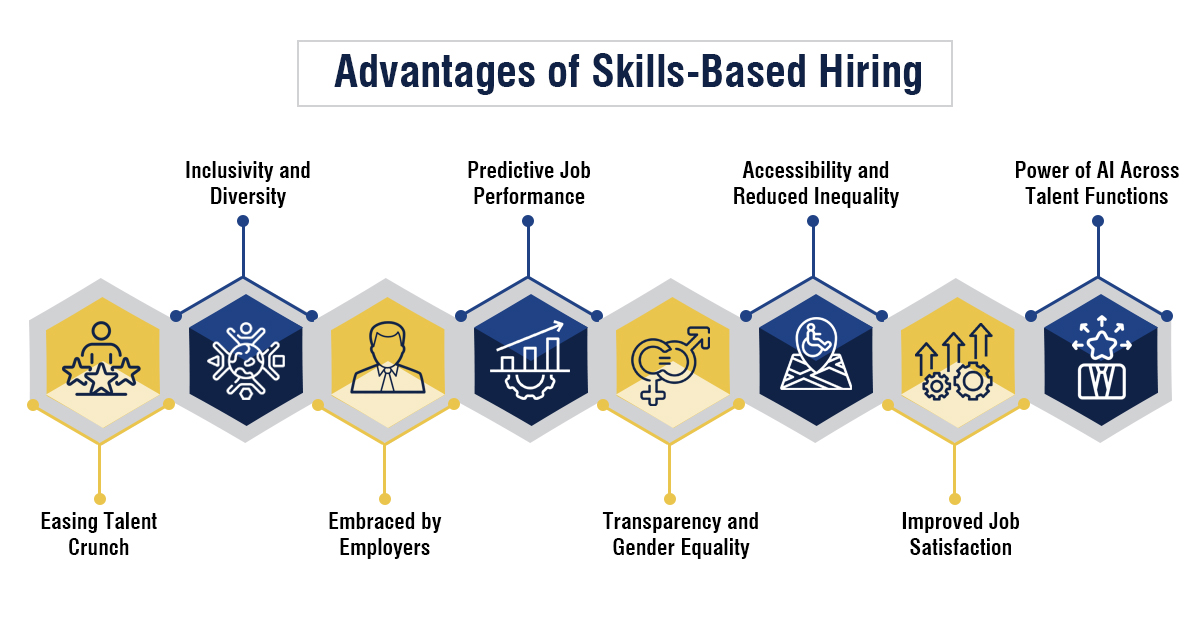Skills-Based Hiring: Redefining HR’s Role in Tackling Talent Challenges
January 18, 2024

In the early 2000s, there was a notable trend known as "degree inflation" that intensified after the 2008-2009 Great Recession. But fast forward a decade, the tide of degree inflation receded making way for a new evolution; perhaps accelerated by the COVID-19 pandemic— the skill-based recruitment trend.
According to a study conducted by Harvard Business School (HBS) and the Burning Glass Institute in 2022, from 2017 to 2019, a notable shift occurred as employers scaled back degree requirements, impacting 46% of middle-skill positions and 31% of high-skill positions.
The Future of Recruiting Report in March 2023 indicated a similar trend—
75% of recruiting professionals foresee skills-first hiring becoming a priority for their companies within the next 18 months.
The pivotal role in orchestrating this evolution falls on the shoulders of HR professionals.
They play a vital role in driving the evolution of recruitment strategies and helping organizations stay ahead in the competitive hiring landscape. Let's take a closer look.
What are Skills-Based Recruitment and How Does It Work?
Skills-based hiring is an approach in talent acquisition that selects candidates based on their unique abilities and skills rather than relying on traditional measures such as previous job titles or educational achievements. Research by Korn Ferry indicates that by 2030 there will be
-
Anticipated shortage of skilled workers projecting a loss of 1.7 trillion USD for U.S. companies.
-
Increased competition for highly sought-after skills.
-
Departure from conventional criteria.
-
Jobs are analyzed based on essential tasks and corresponding skills.
Many HR professionals are now adopting a skill-based recruitment method that offers a more objective and efficient way to evaluate candidates. This shift in focus is bringing about a significant change in the way HR careers are being perceived.
What are the Advantages of Skills-Based Hiring?
With this strategy, HR leaders can tap into a broader talent pool, considering individuals who may not have followed traditional career paths but still possess the skills required to make a meaningful impact. The main advantages are—

-
Easing Talent Crunch
In industries facing tight labor markets, a skills-first approach helps companies tap into a more expansive talent pool, offering a long-term solution to the talent crunch. Globally, talent pipelines can increase nearly tenfold with this approach, and in the US, the increase is a remarkable 19 times.
-
Inclusivity and Diversity
Skills-based hiring opens doors for non-traditional candidates, including those without conventional credentials. Women and underrepresented groups benefit significantly, with a projected 24% increase in the global talent pool of women in roles where they are underrepresented.
-
Embraced by Employers
Many employers are already adding skills-based hiring practices as mandatory HR skills to address post-pandemic challenges in finding and retaining talent. Over the past year, 45% of hirers used skills-data, reflecting a 12% year-on-year increase.
-
Predictive Job Performance
For employers, hiring based on skills proves five times more predictive of job performance than education-based hiring and more than twice as predictive as experience-based hiring. This model enhances the likelihood of finding and retaining top-performing employees.
-
Transparency and Gender Equality
By promoting skill qualification transparency, a skills-first model motivates more women to apply for jobs, resulting in 1.8 times increase compared to men. This positively impacts hiring outcomes and addresses gender disparities in the workforce.
-
Accessibility and Reduced Inequality
Removing degree requirements expands access to higher-paying positions for workers overlooked by employers. This contributes to decreasing inequality by fostering a more diverse workforce, especially benefiting underrepresented groups.
-
Improved Job Satisfaction
When employees are hired based on their skills and competencies, there is a higher likelihood of job satisfaction and performance. Matching individuals with roles that align with their strengths and abilities fosters a sense of fulfillment, leading to increased engagement and productivity. This, in turn, contributes to lower turnover rates and a more stable workforce.
-
Power of AI Across Talent Functions
Skills-based transformation extends beyond hiring, impacting internal mobility, talent management, learning, and workforce planning. AI-driven HR tech tools play a pivotal role in identifying internal skills, defining gaps, and swiftly locating candidates in alignment with organizational talent goals.
The Result of Skill-Based Hiring: Potential Challenges and Solutions
While skills-based recruitment offers numerous benefits, it is not without its challenges—
-
The ongoing reset in hiring practices holds significant importance for increasing equity in the labor market.
-
A crucial step towards achieving this goal is the removal of barriers to well-paying jobs and inflated degree requirements have been identified as one such obstacle in recent years.
While recognizing that each company has unique needs, it is essential for organizations and HR professionals to critically assess the value of outdated instruments and assumptions when crafting job descriptions and evaluating candidates.
However, one potential concern is,
-
The need for effective skills assessment tools and methodologies.
Organizations must invest in robust assessment of HR skills that accurately measure the relevant competencies for each role. Additionally, overcoming biases in the recruitment process requires ongoing training and awareness programs.
Another challenge is,
-
The potential resistance to change within organizations accustomed to traditional hiring practices.
Dropping conventional practices in one go is not possible for any organization. Thus, to bring a change, it's crucial to showcase success stories and demonstrate how this approach aligns with the organization's long-term goals.
Navigating the Accelerating Pace of Change
Successful skills-based hiring stands to benefit both previously overlooked workers, who can now pursue attractive career pathways without a four-year degree, and companies, which will be more adept at filling essential positions in their workforce.
The transformation to a skill-based approach may seem formidable initially, as it transcends the checkbox mentality. However, its positive impact is enduring. Acknowledging that the skills gap won't vanish overnight, organizations must continue to adopt skills-based recruitment in HR careers as a strategic move and gear up for the talent war in the upcoming year.

